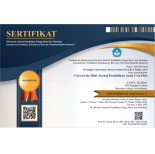KEPERCAYAAN DIRI DAN KECERDASAN MENGASIHI (LOVING INTELLIGENCE): KOMPETENSI GURU PAUD INKLUSI MASA KINI
Abstract
Abstract:. This research stems from the latest phenomenon about the low results of the Teacher Competency Test as an impact of the teacher's lack of confidence in making teaching patterns according to student needs. The teacher's view of the quality of themselves and the ability to build relationships with students is the basis of this research, especially the belief that it is difficult to teach students with special needs. This study aims to look at the personal and social competencies of prospective teacher students as seen from their relationship / teacher-student relations with children with special needs in the inclusive school setting. The research method used was action research with a subject of 73 students of PAUD teacher candidates. Measurement uses a STRS (Student-Teacher Relationship Scale) instrument, to identify the level of relationship between prospective teacher and student students, especially students with Special Education Need (SEN). The results of the study indicate the low quality of student teacher relations with students, especially students with special needs in inclusive classes, this is reflected in the high conflict, high dependence beliefs and low aspects of closeness.
Keywords: Self-confidence, Loving Love, Inclusive Teacher
Abstrak: Penelitian ini bermula dari fenomena terkini tentang rendahnya hasil Uji Kompetensi Guru sebagai dampak dari minimnya kepercayaan diri guru untuk membuat pola pengajaran sesuai dengan kebutuhan siswa. Pandangan guru terhadap kualitas diri dan kemampuan membangun hubungan dengan siswa, menjadi landasan penelitian ini dilakukan, terutama keyakinan sulitnya mengajar siswa dengan berkebutuhan khusus. Penelitian ini bertujuan untuk melihat kompetensi pribadi dan sosial mahasiswa calon guru yang terlihat dari hubungannya/ teacher-student relation dengan anak-anak berkebutuhan khusus di setting sekolah inklusi. Metode penelitian yang digunakan adalah penelitian tindakan dengan subjek sebanyak 73 mahasiswa calon guru PAUD. Pengukuran menggunakan instrumen STRS (Student-Teacher Relationship Scale), untuk mengidentifikasi tingkat hubungan mahasiswa calon guru dan siswa terutama siswa dengan Special Education Need (SEN). Hasil penelitian menunjukkan rendahnya kualitas hubungan mahasiswa calon guru dengan siswa terutama siswa berkebutuhan khusus dalam kelas inklusif, hal ini tercermin pada tingginya konflik, keyakinan ketergantungan yang tinggi dan aspek kedekatan yang rendah.
Kata Kunci: Kepercayaan diri, Kecerdasan mengasihi, Guru Inklusif
Full Text:
PDF (Bahasa Indonesia)References
Avramidis, E., and Norwich, B. (2002). Teachers' Attitudes towards Integration/Inclusion: a Review of the Literature. European Journal of Special Needs Education, 17(2), 129-147.
Berry, R. A. W. (2006). Inclusion, Power, and Community: Teachers and Students Interpret The Language of Community in an Inclusion Classroom. American Educational Research Journal, 43(3), 489- 529
Gloppen, Kari M, dkk. (2010). Confidence as a Predictor of Sexual and Reproductive Health Outcomes for Youth. Journal of Adolescent Health 46 (2010) S42–S58 doi:10.1016/j.jadohealth.2009.11.216
Isosomppi,L, Leivo, M. (2015). Becoming an inclusive teacher at the interface of school and teacher education. Procedia - Social and Behavioral Sciences 171 ( 2015 ) 686 – 694. doi: 10.1016/j.sbspro.2015.01.178
Kompas. (2018).Anggaran Untuk Tingkatkan Mutu Guru. Kompas Tanggal 14 September 2018. Diakses dari: https://www.pressreader.com/similar/281603831368597
Lenney, E. (1977). Women's self-confidence in achievement settings. Psychological Bulletin, 84(1), 1-13. http://dx.doi.org/10.1037/0033-2909.84.1.1
Majelis Luhur Persatuan Tamansiswa. (2013). Ki Hajar Dewantara: Jilid I (Pendidikan). Yogyakarta: UST Press &
Nathaniel, Branden. (1969). Psychology Self Esteem.USA. Tarcher
Noreen M. Clark, O. Nyaga Gakuru. (2014). The Effect on Health and Self-Confidence of Participation in Collaborative Learning Activities. Health education and behavior 2014 vol 41(5): 476-484 https://doi.org/10.1177/1090198114549157
Shepherd, Peter.. Heart Intelligence By Tools for Transformation. Diakses dari: https://trans4mind.com/heart/Heart.pdf
Stankov, Lazar, Lee ,Jihyun. (2014). Overconfidence Across World Regions. Journal of Cross-Cultural Psychology 2014, Vol. 45(5) 821–837, https://doi.org/10.1177/0022022114527345
Stephanie Atherton. (2016). Self-Confidence and Paranoia: An Experimental Study Using an Immersive Virtual Reality Social Situation. Behavioural and Cognitive Psychotherapy, 2016, 44, 56–64 doi:10.1017/S1352465814000496
Suryosubroto, B. (2001). Proses Belajar Mengajar di Sekolah. Jakarta: Rineka Cipta
Syah, Muhibbin. (1995). Psikologi Pendidikan Suatu Pendekatan Baru. Bandung : Remaja Rosdakarya.
Syarifudin Yunus. (2017). Mengkritisi Kompetensi Guru. Detiknews Jumat 24 November 2017, 14:06 WIB. Diakses dari: https://news.detik.com/kolom/d-3741162/mengkritisi-kompetensi-guru
Undang Undang Republik Indonesia Nomor 14 Tahun 2005 Tentang Guru dan Dosen.
DOI: https://doi.org/10.17509/cd.v9i2.14130
Refbacks
- There are currently no refbacks.
Copyright (c) 2018 UPI kampus cibiru

This work is licensed under a Creative Commons Attribution-ShareAlike 4.0 International License.
Cakrawala Dini: Jurnal Pendidikan Anak Usia Dini
Published in collaboration Program Studi PGPAUD UPI Kampus Cibiru, APG PAUD Indonesia, and PPJ PAUD Indonesia

Cakrawala Dini: Jurnal Pendidikan Anak Usia Dini is licensed under a Creative Commons Attribution-ShareAlike 4.0 International License.
Based on a work at https://ejournal.upi.edu/index.php/cakrawaladini.














